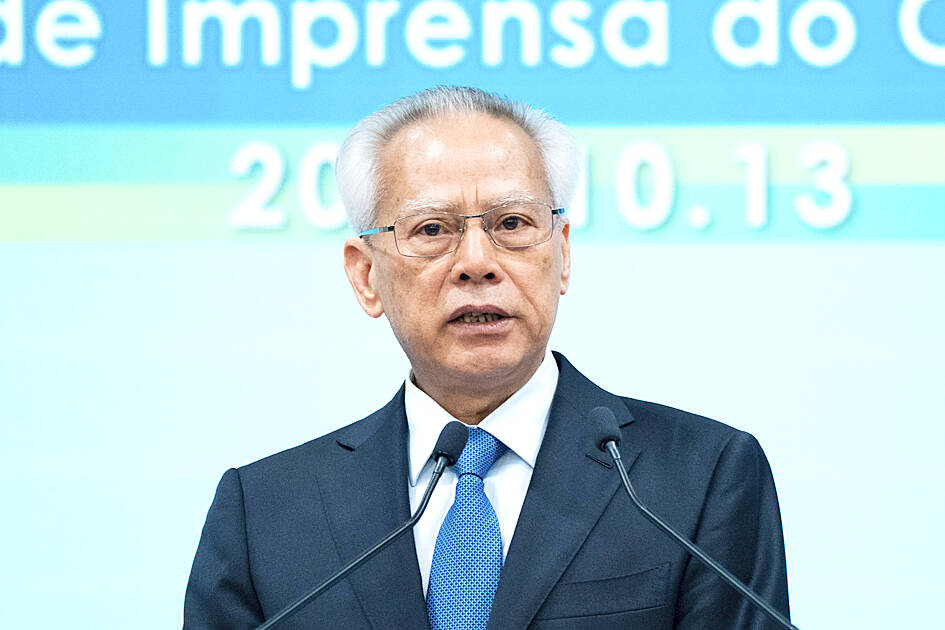Former Macanese judge Sam Hou Fai (岑浩輝), who has warned against the outsize influence of the gambling industry in the city, was elected as its new leader by a 400-member committee.
Sam, 62, the former president of the Macanese Court of Final Appeal, was the sole candidate in the election for chief executive. He received 394 of 398 votes cast yesterday, with the remaining four being blank.
Sam’s victory raises questions about the outlook for the world’s biggest casino market. In August, he warned against the dominant role the gaming centers play in the local economy, saying that “for a period of time, the tourism and gaming industry developed in a disorderly manner and expanded wildly.”

Photo: AP
Having one industry dominate the city “is not beneficial for Macau’s long-term development,” he said.
The growth of casinos had strained resources such as the workforce and even narrowed the career choices for young people, Sam said as he called for diversifying away from the industry.
The former judge’s comments coincided with Beijing launching its latest crackdown on money laundering and capital outflows, a move targeting Macau’s money-exchanging activities.
Over the past few years, the city has imprisoned top junket operators, who brought in high rollers and provided them with credit. Macau has also introduced regulations restricting the agents’ activities, resulting in the collapse of the VIP gambling that once contributed half of the city’s casino revenue.
Outgoing Macanese Chief Executive Ho Iat Seng (賀一誠) had said he would not seek another term for health reasons.
Sam becomes the first person born outside Macau to lead the city. He is a native of the neighboring Chinese province of Guangdong and moved to Macau in the 1980s when the city was administered by Portugal.
He studied at Peking University and the University of Coimbra in Portugal, before becoming a judge in Macau in 1997.

INVESTIGATION: The case is the latest instance of a DPP figure being implicated in an espionage network accused of allegedly leaking information to Chinese intelligence Democratic Progressive Party (DPP) member Ho Jen-chieh (何仁傑) was detained and held incommunicado yesterday on suspicion of spying for China during his tenure as assistant to then-minister of foreign affairs Joseph Wu (吳釗燮). The Taipei District Prosecutors’ Office said Ho was implicated during its investigation into alleged spying activities by former Presidential Office consultant Wu Shang-yu (吳尚雨). Prosecutors said there is reason to believe Ho breached the National Security Act (國家安全法) by leaking classified Ministry of Foreign Affairs information to Chinese intelligence. Following interrogation, prosecutors petitioned the Taipei District Court to detain Ho, citing concerns over potential collusion or tampering of evidence. The

‘FORM OF PROTEST’: The German Institute Taipei said it was ‘shocked’ to see Nazi symbolism used in connection with political aims as it condemned the incident Sung Chien-liang (宋建樑), who led efforts to recall Democratic Progressive Party (DPP) Legislator Lee Kun-cheng (李坤城), was released on bail of NT$80,000 yesterday amid an outcry over a Nazi armband he wore to questioning the night before. Sung arrived at the New Taipei City District Prosecutors’ Office for questioning in a recall petition forgery case on Tuesday night wearing a red armband bearing a swastika, carrying a copy of Adolf Hitler’s Mein Kampf and giving a Nazi salute. Sung left the building at 1:15am without the armband and apparently covering the book with a coat. This is a serious international scandal and Chinese

Seventy percent of middle and elementary schools now conduct English classes entirely in English, the Ministry of Education said, as it encourages schools nationwide to adopt this practice Minister of Education (MOE) Cheng Ying-yao (鄭英耀) is scheduled to present a report on the government’s bilingual education policy to the Legislative Yuan’s Education and Culture Committee today. The report would outline strategies aimed at expanding access to education, reducing regional disparities and improving talent cultivation. Implementation of bilingual education policies has varied across local governments, occasionally drawing public criticism. For example, some schools have required teachers of non-English subjects to pass English proficiency

TRADE: The premier pledged safeguards on ‘Made in Taiwan’ labeling, anti-dumping measures and stricter export controls to strengthen its position in trade talks Products labeled “made in Taiwan” must be genuinely made in Taiwan, Premier Cho Jung-tai (卓榮泰) said yesterday, vowing to enforce strict safeguards against “origin laundering” and initiate anti-dumping investigations to prevent China dumping its products in Taiwan. Cho made the remarks in a discussion session with representatives from industries in Kaohsiung. In response to the US government’s recent announcement of “reciprocal” tariffs on its trading partners, President William Lai (賴清德) and Cho last week began a series of consultations with industry leaders nationwide to gather feedback and address concerns. Taiwanese and US officials held a videoconference on Friday evening to discuss the